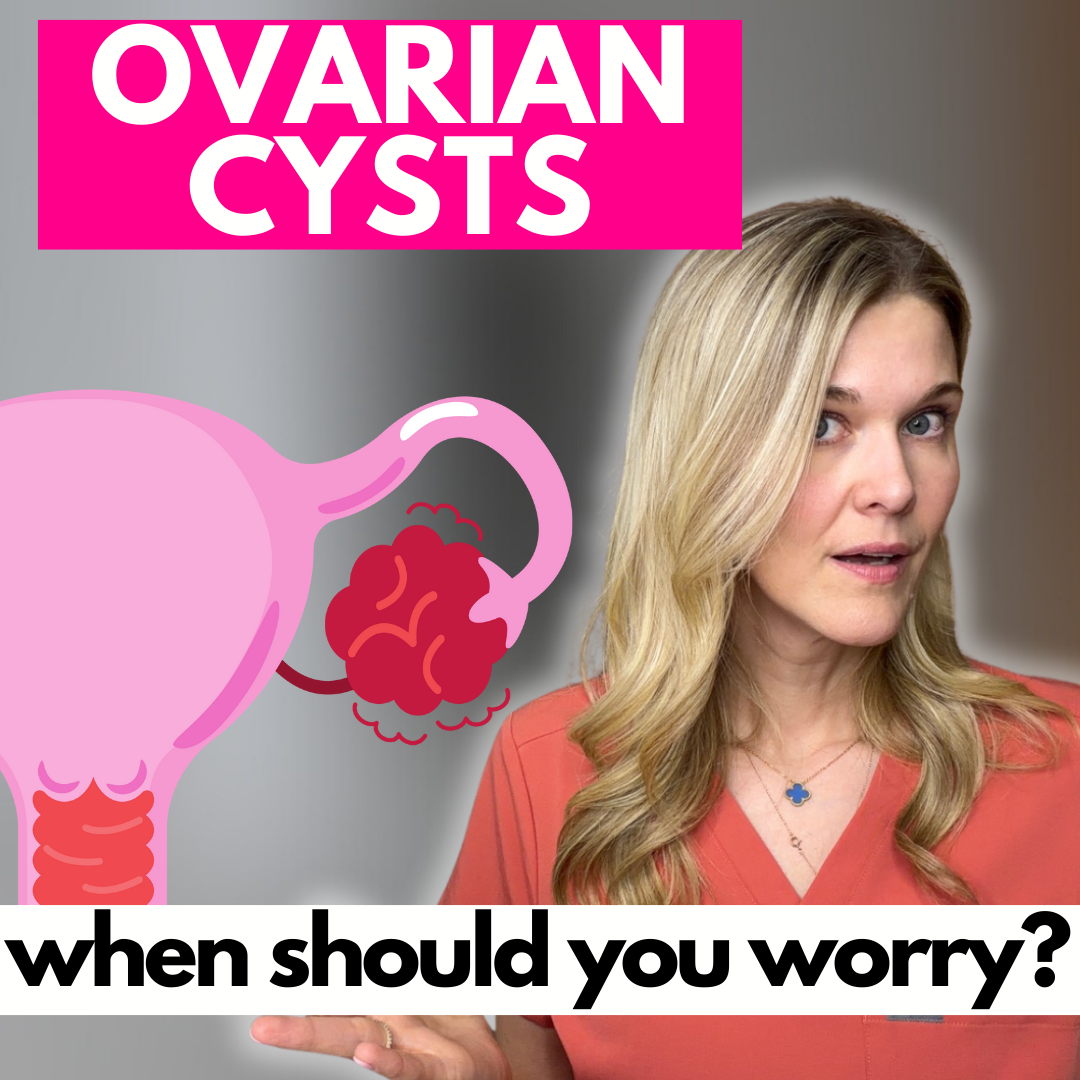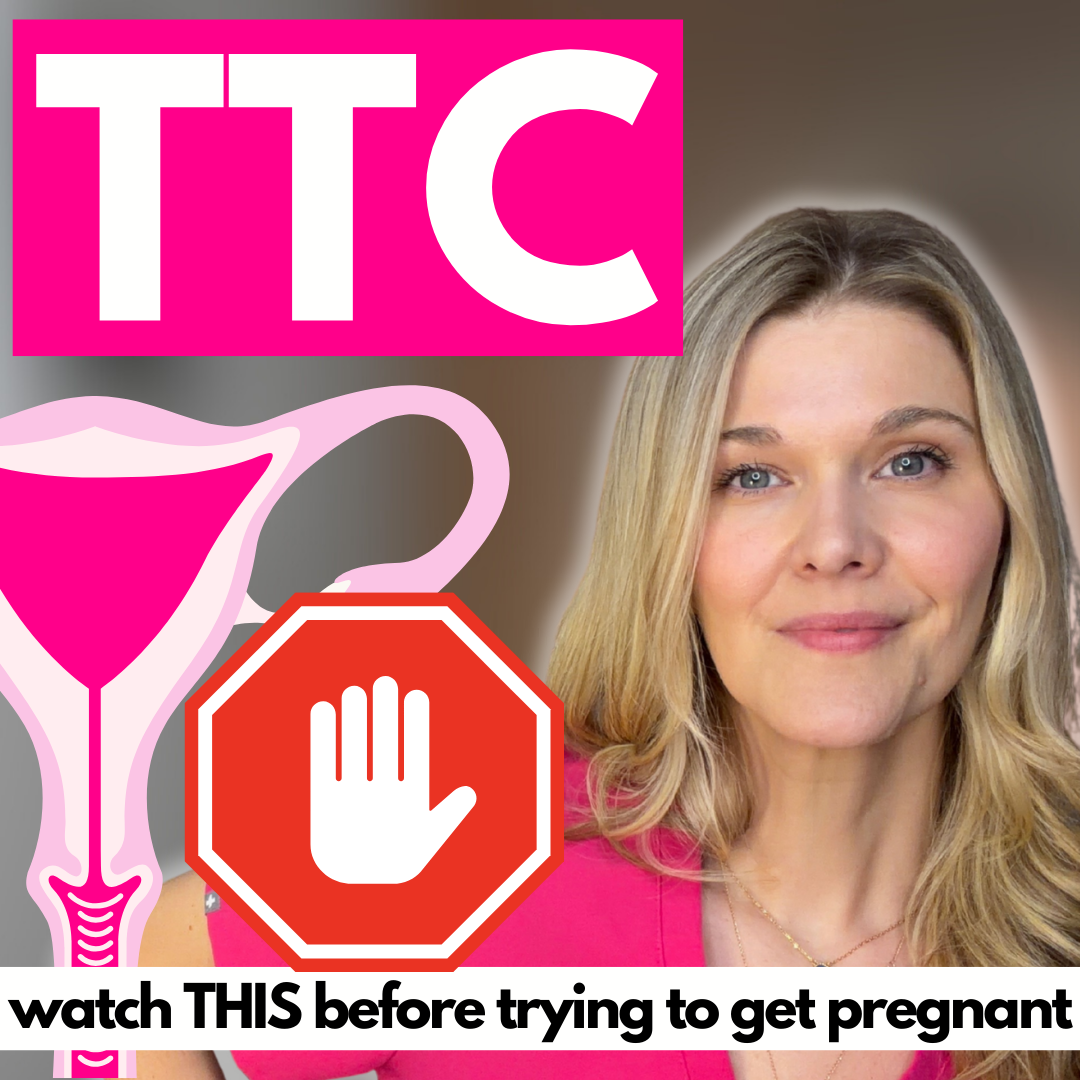Fertility + Hormones + Health + Lifestyle
Welcome to the blog
Ovarian Cysts: When They’re Normal vs When They’re a Problem
Ovarian cysts are common—but when are they normal, and when should you worry? Dr. Natalie Crawford, Board-Certified OB-GYN and Reproductive Endocrinologist, explains what ovarian cysts are, how they form, and when they may impact hormones, fertility, or IVF cycles. Learn the difference between functional cysts and more concerning cysts like endometriomas and dermoids, and understand how cysts relate to FSH, LH, estrogen, and progesterone so you can better advocate for your reproductive health.
Exercise and Fertility | Can You Exercise During the Two-Week Wait? What’s Safe in the Luteal Phase?
Dr. Natalie Crawford, board-certified OB-GYN and Reproductive Endocrinologist, breaks down whether you can—and should—exercise during the luteal phase and the two-week wait. She explains how progesterone changes your metabolism, recovery, and energy after ovulation, why strength training is still encouraged, and how to modify workouts if you’re trying to conceive or undergoing fertility treatment.
5 Things I Wish I Knew Before TTC | Common Fertility Myths & What Actually Works
Dr. Natalie Crawford, board-certified OB-GYN and REI, breaks down five essential fertility truths every person should know before trying to get pregnant. From cycle tracking and luteal phase health to male factor fertility and inflammation, this will help you better understand your body and advocate for your fertility.
What To Do If You Have Implantation Failure | Next steps After a Failed Embryo Transfer
Dr. Natalie Crawford, board-certified OB-GYN and REI, breaks down what it really means when genetically normal embryos fail to implant during IVF. She explains realistic success rates, why implantation isn’t guaranteed even with euploid embryos, and how fertility specialists evaluate recurrent implantation failure. Dr. Crawford walks through embryo factors, uterine environment, inflammation, lifestyle influences, and the different frozen embryo transfer protocols used to improve outcomes—while also addressing common tests, treatments, and misconceptions.
What Are the Different Types of Miscarriages? What To Do If You Are Having a Pregnancy Loss?
Miscarriage is far more complex—and far more common—than most people realize. Dr. Natalie Crawford, board-certified OB-GYN and REI, breaks down the different types of miscarriage and pregnancy loss and explains what the medical terminology actually means. Using clinical experience, evidence-based medicine, and real patient scenarios, Dr. Crawford walks through what happens at different stages of pregnancy loss, how miscarriages are diagnosed and managed, and what follow-up care is essential to protect your health and future fertility.
TTC and Alcohol: Can You Drink Alcohol While Trying To Get Pregnant? | Fertility Doctor Explains
Can you drink alcohol while trying to get pregnant? Dr. Natalie Crawford, board-certified OB-GYN and REI, breaks down the science behind alcohol and fertility. Using population-based research and real fertility data, Dr. Crawford explains what actually affects your chances of conceiving—and what choices are within your control when trying to get pregnant spontaneously or through IVF.
6 Things You Need to Know About Male Fertility If You Want To Conceive | Improve Sperm Quality
Trying to get pregnant? Male fertility plays a major role, yet it's rarely talked about. Dr. Natalie Crawford, Board-Certified OBGYN & REI, explains what every partner should do to boost sperm health and support the fertility journey. Learn the biggest lifestyle factors that affect sperm count and quality, common mistakes like testosterone use, the truth about heat and cannabis, how often to ejaculate, and when to get a semen analysis. Fertility is a team effort, and these steps can help you get pregnant faster and improve your chances of a healthy pregnancy.
Luteal Phase Defect: Is Your Luteal Phase Normal? | Understanding Progesterone and Ovulation
Dr. Natalie Crawford breaks down the science and misconceptions surrounding the luteal phase and luteal phase defects. She explains what a normal luteal phase looks like, what it truly means to have a luteal phase defect, and why progesterone alone is not usually the root cause. Dr. Crawford walks viewers through how ovulation actually happens, why tracking ovulation accurately matters, and the real hormonal and structural issues that can shorten the luteal phase or cause spotting.
Do You Have PCOS? Symptoms, Testing, and Next Steps for Polycystic Ovarian Syndrome
Dr. Natalie Crawford, board-certified OBGYN and REI, breaks down what PCOS is, how it’s diagnosed, and why so many people feel confused about their symptoms. She explains what everyone should understand about their hormones, cycles, and fertility. This video is for anyone wondering whether they may have PCOS or simply wanting to better understand their body.
Two-Week Wait Symptoms & Implantation Signs: What’s Actually Happening in Your Body
Dr. Natalie Crawford, board-certified OBGYN and REI, breaks down exactly what happens in your body during the two-week wait—from ovulation to fertilization to implantation. Learn the real physiology behind luteal-phase symptoms, how the embryo develops as it travels through the fallopian tube, what true implantation signs might look like, and when pregnancy tests can reliably detect HCG. If you’re wondering what’s normal, why the wait feels so long, or how to understand your body’s signals, this video gives you a clear, science-based timeline.
A Guide To Hormone Testing for Women: What to Test and When | FSH, LH, Estradiol, AMH, and More
Dr. Natalie Crawford, board-certified OB/GYN and REI, breaks down what every woman should know before testing their hormones. Hormones shift throughout the menstrual cycle, and understanding when to test—and how to interpret results—is crucial. Dr. Crawford explains the purpose of common hormone labs, including FSH, LH, estradiol, AMH, progesterone, TSH, and prolactin, and how timing, birth control, fertility status, and menstrual regularity impact lab values. She also highlights the difference between “normal” and “optimal” hormone levels and why lab ranges alone don’t tell the full story.
Top 5 Fertility Questions Answered by a Fertility Doctor | Testing, Timing, and Ovulation
Dr. Natalie Crawford, Board-Certified OBGYN and REI, answers the top fertility questions she gets asked every single day. Learn what’s normal, when to worry, and the science behind your cycle so you can take control of your reproductive health. Whether you’re trying to conceive now or simply planning ahead, this video will help you better understand your body and make informed decisions about your reproductive health.
Should You Be Fasting While Trying to Get Pregnant? | How Fasting Impacts Fertility and Hormones
Fasting is a huge health trend, but should you be doing it if you’re trying to get pregnant? Dr. Natalie Crawford, Board-Certified OBGYN and REI, explains how fasting and insulin resistance affect your hormones, ovulation, and fertility. Many women turn to fasting for metabolic health, but few understand how it can impact the delicate communication between your brain and ovaries. Dr. Crawford breaks down the science behind fasting, how it influences insulin sensitivity, and what type of eating window best supports your hormones and fertility
What Your Period Tracker Isn't Telling You About Your Hormone Health | Learn How To Track Your Cycle
Your period is a vital sign. Dr. Natalie Crawford, Board-Certified OBGYN and REI, explains how your menstrual cycle reflects your overall hormonal health. Most women rely on tracking apps alone, but those can miss key clues about what’s actually happening inside your body. Dr. Crawford breaks down how to really listen to your body by understanding your symptoms, identifying ovulation, and recognizing when your cycle might be signaling something is off.
Is Spotting Normal? When Should You Be Worried About Spotting Between Your Periods?
Spotting between periods is one of the most common concerns women have about their cycles—but is it normal or a sign of a problem? Dr. Natalie Crawford, MD, board-certified OBGYN and REI, explains what spotting really means and why it’s important not to ignore it. While occasional spotting can be harmless, persistent or unusual spotting may point to underlying issues. By understanding the difference between normal and abnormal spotting, Dr. Crawford helps women take charge of their reproductive health, recognize red flags, and feel more confident about their cycles.
Top Questions to Ask Before IVF: What Should You Know Before Starting IVF?
Are you preparing for IVF or wondering if it’s the right step for you? Board-certified OBGYN and REI, Dr. Natalie Crawford, shares the 8 most important questions to ask before starting IVF. Too often, patients feel overwhelmed, unsure of what to expect, or don’t know what to ask their doctor. This guide will help you feel confident, informed, and empowered on your fertility journey.
Male Fertility: 10 Things Your Partner MUST Do (or Stop Doing) to Boost Fertility and Sperm Health
Dr. Natalie Crawford, board-certified OBGYN and REI, explains the critical role of male fertility when trying to conceive. She shares ten essential things your partner should do — or stop doing — to improve sperm health and hormone balance. Dr. Crawford discusses lifestyle factors that harm sperm quality, simple changes that can boost fertility in just three months, and the importance of proactive testing and health checks.
What a Fertility Doctor Would Do If Trying to Get Pregnant Today | Top Tips For TTC
Dr. Natalie Crawford, board-certified OBGYN and REI, shares exactly what she would do if she were trying to conceive today. In this video, she explains how to track cycles, what baseline tests to ask for, and why early partner testing is important. She also covers key lifestyle changes that can improve fertility. Dr. Crawford highlights the importance of prenatal vitamins and supplements, as well as setting realistic expectations during the TTC journey.
Ovulation 101: How to Know If It’s Actually Happening + Best Ways to Track Fertility
Dr. Natalie Crawford, board-certified OB/GYN and REI, breaks down how to know if you are actually ovulating. She explains the menstrual cycle in simple terms and what can go wrong in the process. Dr. Crawford discusses the signs of healthy ovulation, red flags that may point to ovulatory dysfunction, and practical tools for tracking ovulation. She empowers you to use your menstrual cycle as a vital sign for overall health and fertility, offering science-backed strategies to take charge of reproductive health.
Struggling To Get Pregnant? 5 Common Causes of Fertility Struggles And What You Should Do
Dr. Natalie Crawford, a board-certified OB-GYN and REI, breaks down the top 5 causes of infertility—from ovulation issues and blocked tubes to male factors and egg quality. She also discusses the truth about “unexplained infertility” and how inflammation may play a role. Learn what to look for, when to get evaluated, and how lifestyle changes can make a difference.





















